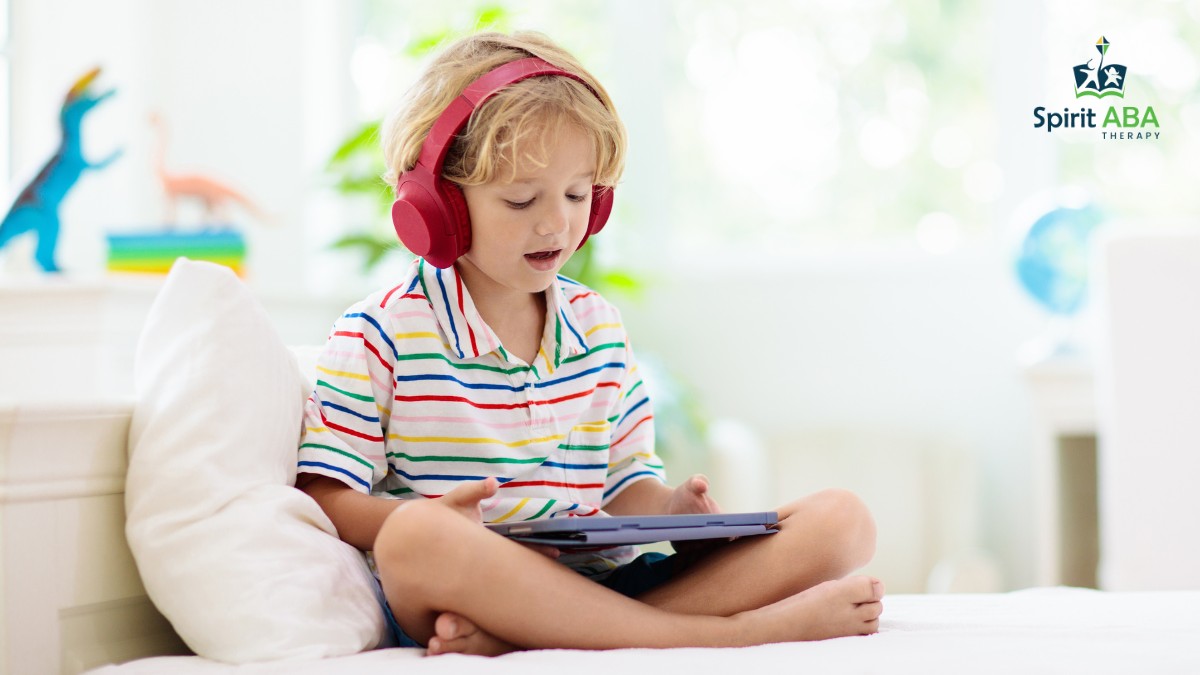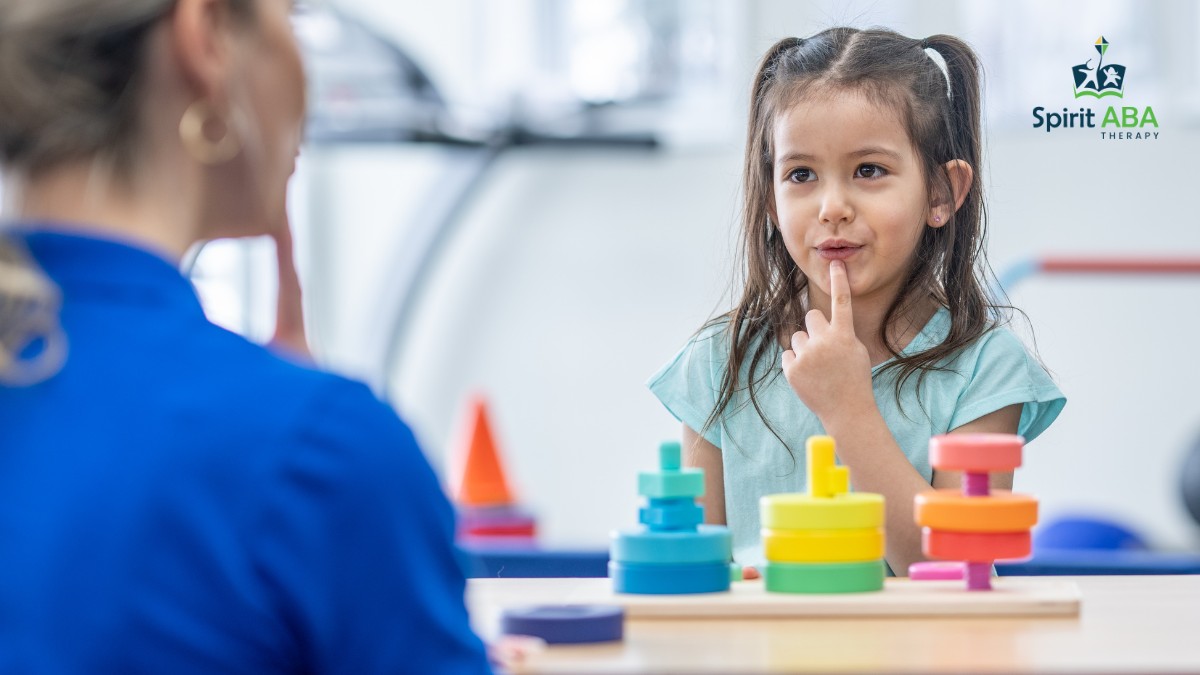Key Points:
- Repetitive language is common in autism and can serve different purposes, including communication and self-regulation.
- Types of repetitive speech include echolalia and perseveration, each with unique functions and challenges.
- ABA therapy can help children develop more flexible and meaningful communication skills.
If your child repeats words, phrases, or entire sentences often, you’re not alone. Many autistic children use repetition to communicate, self-soothe, or process language. While it might seem unusual, this behavior serves a purpose. Learning why it happens can help you better support your child’s communication growth.
What Is Repetitive Language in Autism?
Repetitive language refers to the repeated use of words, phrases, or sounds in communication. This can include immediate repetition, delayed repetition, or persistent focus on specific topics. While this behavior is most commonly associated with autism, it can also be seen in other developmental conditions.
Children may repeat language for different reasons, including:
- Processing spoken words before forming their own responses.
- Expressing excitement, stress, or other emotions.
- Seeking sensory input or self-soothing.
- Communicating needs when other forms of expression feel difficult.

Types of Repetitive Language in Autism
Not all repetitive speech is the same. It can take different forms, each serving a unique role in a child’s communication development.
1. Echolalia
Echolalia is one of the most common forms of repetitive language in autism. It occurs when a child repeats words or phrases they have heard before. It can be:
- Immediate echolalia – Repeating words right after hearing them. Example: If you ask, “Do you want juice?” the child might respond, “Do you want juice?” instead of answering yes or no.
- Delayed echolalia – Repeating phrases from past conversations, TV shows, or books at a later time. Example: A child may say a commercial jingle when they are excited, even if it’s unrelated to the situation.
2. Perseveration
Perseveration happens when a child continuously talks about a single topic, phrase, or idea, even when it’s no longer relevant. Unlike echolalia, which is direct repetition, perseveration is more about getting stuck on a thought or subject.
- Example: A child who loves dinosaurs might repeatedly talk about T-Rexes, even in unrelated conversations.
- Purpose: It can be a way to self-soothe, regulate emotions, or stay engaged in communication.
3. Scripted Language
Scripted language refers to memorized phrases or sentences a child uses in conversations. These scripts may come from TV shows, books, or past interactions.
- Example: A child might always greet people with, “Hello, welcome to my store!” because they heard it on a favorite TV show.
- Purpose: It helps them participate in social interactions, even if the words don’t always fit the situation perfectly.
Why Do Some Children with Autism Rely on Repetitive Speech?
For many children, repeating words provides structure and predictability in communication. It can help them:
- Process and understand language – Some children repeat phrases as a way to practice speech before using their own words.
- Manage emotions and sensory input – Repetition can be soothing, especially in overwhelming situations.
- Communicate when spontaneous speech is difficult – A child may use learned phrases to express needs when they struggle to form their own sentences.
While repetitive language can be a challenge, it’s also an important part of language development for many children.
Should Parents Be Concerned About Repetitive Language?
Not necessarily. Repetitive speech is often a natural part of language development in children with autism. However, if a child’s language skills remain rigid over time, they may benefit from intervention to develop more flexible communication abilities.
Some signs that intervention might be helpful include:
- The child only communicates through repetition and does not generate their own responses.
- Repetitive speech interferes with daily activities or social interactions.
- The child struggles to shift topics, even when prompted.
In these cases, working with a speech therapist or an ABA professional can help guide language development.
How Can ABA Therapy Help with Repetitive Language?
ABA therapy is one of the most effective approaches for helping children with autism expand their communication skills. It provides structured techniques to help children use language more meaningfully.
1. Teaching Functional Communication
ABA professionals use strategies to help children transition from scripted speech to spontaneous language. This includes:
- Modeling appropriate responses – Demonstrating how to answer questions naturally.
- Expanding on a child’s phrases – If a child says, “Want cookie,” a therapist might model, “I want a cookie, please.”
- Using visual supports – Picture schedules and communication boards can help children form independent sentences.
2. Reducing Non-Functional Repetition
If a child relies too much on repetition, ABA therapists work on encouraging more flexible responses. Techniques include:
- Prompting alternative responses – Instead of repeating a question, the child is guided toward answering it.
- Encouraging topic shifts – Teaching how to move on from a perseverative topic when appropriate.
- Reinforcing varied speech – Rewarding spontaneous language rather than repetition.
3. Supporting Emotional Regulation
Since repetitive speech can be a coping mechanism, ABA therapy also helps children develop alternative strategies for managing emotions. This might include:
- Teaching self-regulation techniques like deep breathing.
- Providing sensory-friendly ways to self-soothe.
- Helping children recognize emotions and express them in words.
With the right guidance, children can learn to use language in a way that helps them communicate effectively while still feeling secure.

Find Expert ABA Therapy at Spirit ABA
If your child uses repetitive language and needs support developing more flexible communication skills, Spirit ABA is here to help. Our experienced team provides personalized ABA therapy to encourage meaningful speech development while respecting each child’s unique way of learning.
We provide ABA therapy services in Nebraska, Colorado, and Iowa, offering expert guidance and support for children with autism. Contact us today to learn how we can help your child grow and thrive.


